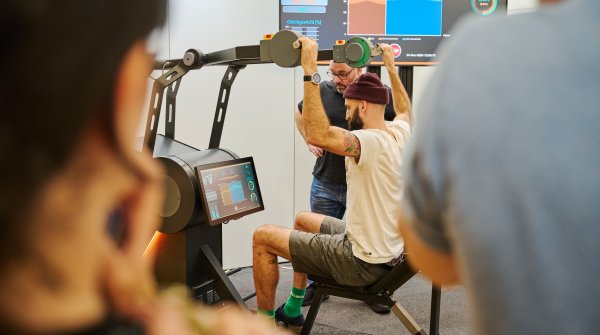Many endurance athletes have now realized that working with a mental coach can help them reach their peak performance. Paula Radcliffe, who long held the women's marathon world record with a time of 2:15:25, commented as follows: "Improving your mental toughness will pay off - not just in running, but in life in general."
Biathlon legends such as Ole Einar Björndalen and Emil Hegle Svendsen were also firm believers in the effectiveness of mental training during their great careers.
Even if this awareness is often present among amateur athletes, in most cases the approach for concrete implementation is missing. First, mental coach Wolfgang Seidl explains the most important basics. The highlight? Three simple exercises for mental training, especially for ISPO.com.
Of course, recreational athletes don't make their living from sports, but they still invest a lot of time in their training and money in their passion. When they can't reach their full potential in competition despite all their efforts, it's frustrating. "Negative thoughts, doubts or nervousness throw a spanner in the works," knows mental coach Wolfgang Seidl - he offers the right mental techniques for precisely these pressure situations.
"Every* athlete who decides to start with mental training starts an inner process," says Seidl. "For this, it is also necessary to face one's weaknesses, to leave one's usual comfort zone and to allow changes." This is not always easy, he said.
You benefit from what you've learned not only in athletic competition, but also in everyday life, whether in your private or professional life. And precisely when it really counts, i.e. when the fear of failure is at its greatest.

Nervousness is paralysing in the truest sense of the word. This tension, as banal as it may sound, is much more often responsible for weaker performances than a lack of muscles or technique. Inner self-doubt, uncontrolled fear of failure and self-imposed pressure weigh at least as heavily as inadequate preparation.
"This is where many make the mistake of not addressing the root cause and instead strengthening their mental skills, but instead trying to bring about success with even more effort and training volume," explains Seidl. The expansion of effort is often even counterproductive because the maxim prevails: I have invested so much, now it MUST pay off.
An overall goal of the mental training-approach is to encourage athletes to reach the state of ideal performance. In other words, exactly that point at which the athletes (still) feel their actions with pleasant ease.
Elementary for this process is self-confidence, which is neither a mere predisposition nor an arbitrary twist of fate.
Only when trail runners, marathon runners or free climbers have confidence in their abilities can they achieve their personal goals. Through his experience, Seidl is convinced that self-confidence can be specifically increased with mental training.
In mental training, athletes learn to consciously train their concentration. They "will experience how much more energy they suddenly have available when they focus their attention in the here and now and steer it in the right direction," Seidl knows from his many years of work.
This is biologically determined, because every thought triggers electrochemical processes in the brain and accordingly has a decisive influence on performance. Anyone who has ever had psychosomatic complaints knows how powerful the unit "body and mind" is.
Mental training deals with a concrete objective in all phases of work. This must be explicitly worked out. Only those who know their own goals can achieve them. Defining the right goals is much more difficult than it seems at first glance. Because it is by no means only about result goals, but in a first step about performance and action goals.
Mental training also helps in the recovery and regeneration process - in finding the balance between tension and relaxation. Especially in today's fast-paced and complex everyday world, where people are constantly exposed to sensory overload, it is all the more important to switch off and to body, mind and soul to take a break.
Mental training also plays an important role in phases in which physical training is not possible due to injury or illness. Physical training is not possible due to injury or illness. A coach helps to maintain focus and accelerate the healing process.
"Anyone can develop and expand mental skills. But it takes time, work and courage to break new ground," Seidl explains. Former Russian world chess champion Garri Kasparov once said:
"We find new ways of solving problems only by looking for new paths and having the courage to follow them. Of course, not all of them lead to the goal, but the more we experiment, the more successful the experiments will be. Let's break our habits! Even the ones we're actually comfortable with, to look for new and better methods."
Words that for Seidl are valid everywhere - whether for sporting, private or professional challenges.
You don't have to hire a trainer, you can lay the foundation for mental health yourself at home with the following exercises:
- Regularly focus on your breathing. When at rest, concentrate on deep and slow abdominal breathing and observe what changes in your body.
- Be aware of your self-talk and thought content often during practice and ask yourself: What thoughts are going through my mind right now and are they helpful or disturbing? Which thoughts would be more helpful and support me better?
- Before training or competing, focus on the process instead of the result!

FAQ
Is mental training important in competitive sports?
Professional athletes also use mental training. Soccer stars like Serge Gnabry and Erling Haaland, for example, successfully keep themselves mentally fit with neuro athletics. Top athletes put their bodies under constant strain, which also affects their mental health. By training the will and the mind, professional athletes not only keep their bodies fit and guarantee maximum performance.
How can I train my mental strength?
Mental strength can be built in a variety of ways. Establish routines, exercise, eat well, control negative thoughts and remove yourself from bad external influences (e.g. toxic environment).
Mental training: Why is healthy nutrition important?
If you consciously pay attention to your diet, you not only provide yourself with important nutrients, but often refrain from temptations. This sensitizes you to good habits and thus also strengthens your willpower.
- Awards
- Mountain sports
- Bike
- Fitness
- Health
- ISPO Munich
- Running
- Brands
- Sustainability
- Olympia
- OutDoor
- Promotion
- Sports Business
- Textrends
- Triathlon
- Water sports
- Winter sports
- eSports
- SportsTech
- OutDoor by ISPO
- Heroes
- Transformation
- Sport Fashion
- Urban Culture
- Challenges of a CEO
- Trade fairs
- Sports
- Find the Balance
- Product reviews
- Newsletter Exclusive Area
- Magazine






